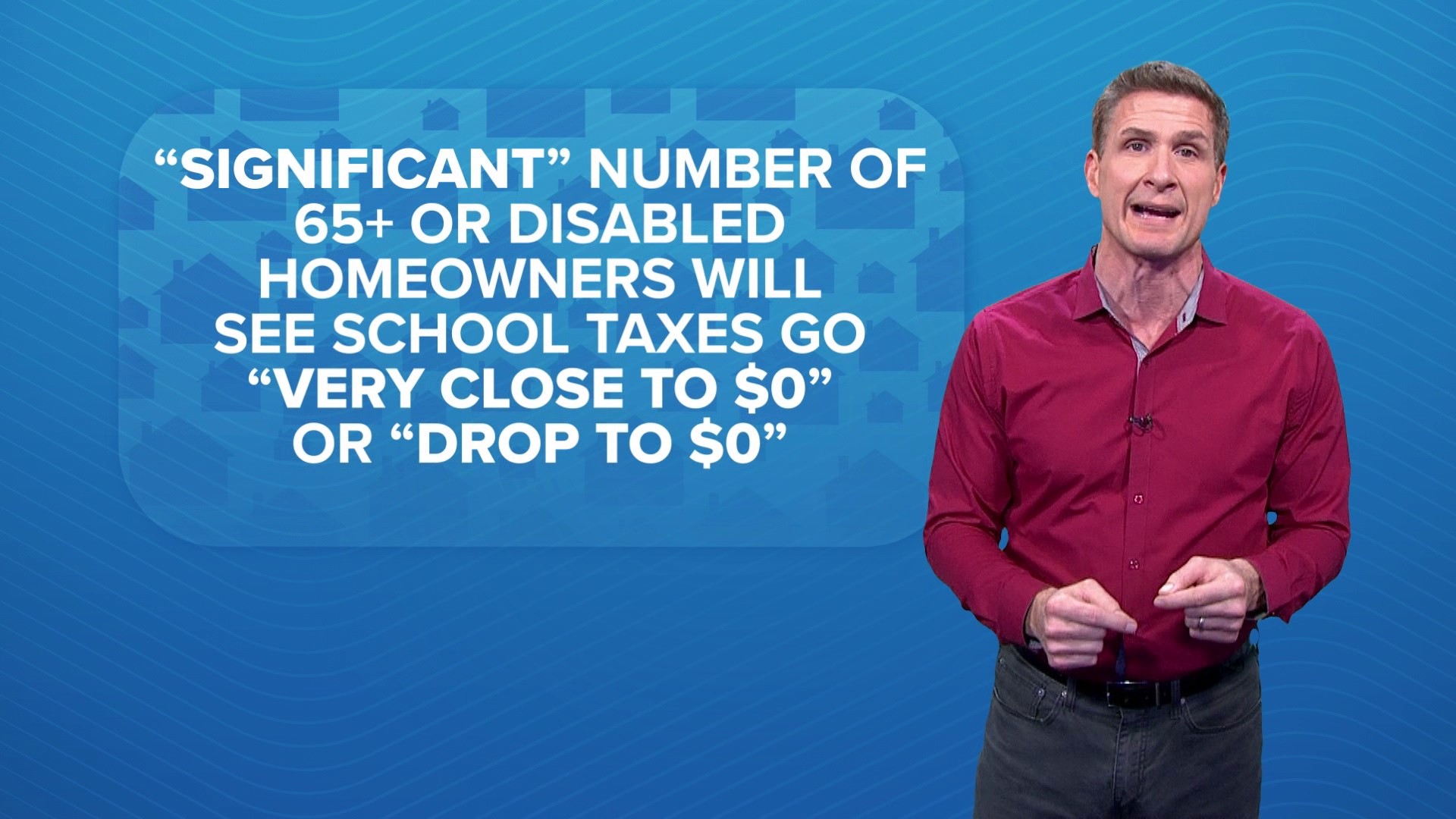TEXAS, USA — Recently, we had a Right on the Money episode about the new property tax relief here in Texas, and specifically what it will do for the estimated two million-plus homeowners who have a ceiling on their school taxes.
Ceilings explained…
As we talked about before, that ceiling is the amount of school taxes owed the year someone with a homestead turns 65 or becomes disabled. Generally, in subsequent years, their school taxes will be equal to or less than that ceiling, but not above that amount –- not even if a hot real estate market makes their home value go up a lot. An exception is if one of those homeowners makes significant improvements to their home in the future.
At first, some officials from the state and from an appraisal district weren’t sure how the tax relief legislation would apply to homeowners who have ceilings. After we kept asking questions, the office of State Sen. Paul Bettencourt, who authored the legislation, got together with the Texas lieutenant governor’s office, explained the math, and told us a “significant” number of those over 65 or disabled homeowners would see their school taxes go “very close to $0” or would “drop to $0”.
That much-reduced figure would become their new tax ceiling going forward. Again, as long as they don’t significantly improve their homes in the future, it’s possible many of them will never pay school taxes again.
The proof is in the tax bills
Still, we wanted to see actual tax bills that prove this. Indeed, a senior homeowner from Collin County who we talked about last time confirms their school taxes, which had held steady at $1,245 per year since they qualified for a ceiling a decade ago, have dropped to $0 now. That means that their school tax ceiling has also dropped to zero.
How often is that happening? We are asking some tax assessor-collectors. So far, we have only gotten preliminary figures from just Dallas County — but it gives an idea. The office of Dallas County Tax Assessor/Collector John Ames says last year about 25% of homeowners with tax ceilings owed $0 in school taxes.
With new relief applied now, they say that preliminarily, 60% of homeowners who had ceilings have dropped to $0 in school taxes. More specifically, they say “The number of homeowners whose tax ceiling has been lowered to zero has increased from 23,182 to 55,415”.
That’s three out of five homeowners who have a ceiling dropping to a $0 school tax bill,. And that may be their school tax bill for the rest of their lives. The legislation provides for the state to make up what those homeowners are no longer paying. We’ll see how that happens in years when the state doesn’t have a budget surplus like it does now.
But…voters still have to approve it
Again, all this has to be approved by voters on Nov. 7 (or Oct. 23-Nov. 3 for those who cast ballots in early voting). This is just one of 14 constitutional amendments voters will decide this year.
Some of them involve huge sums of money and some of them, including the property tax relief amendment, will affect a huge number of Texans. Maybe because of that, we will see better turnout than the dismal showings we have seen in prior constitutional amendment elections in Texas:
- 2017: Registered voters: 15,099,137 Turnout: 5.81%
- 2019: Registered voters: 15,962,988 Turnout: 12.43%
- 2021: Registered voters: 16,968,756 Turnout: 8.75%
If you sit out this one out, other voters will decide issues like Propositions 2 and 4 which would allow property tax exemptions for childcare centers and, as outlined above, billions of dollars from the state surplus to push down homeowner property taxes.
Also Props 5, 6 and 7 — which would set aside millions for research at Texas universities and billions to finance new drinking water projects, more gas fired electric plants and to give pension increases to retired teachers who haven’t had a raise in many years.
And there’s Prop 3, which would prohibit legislators from creating a wealth tax on rich Texans without voters approving it first. Of course, none of the propositions are worded that simply. These ballots sometimes seem like they are written in Greek.
There are actually two different mathematical formulas, explained here, that can be applied to determine their readability scores. For instance, Ballotpedia includes those scores here for Proposition 3.
For plain English descriptions of each amendment on the ballot, watch or take a listen to last week’s episode of our Y’all-itics Texas political podcast. And then go vote!

